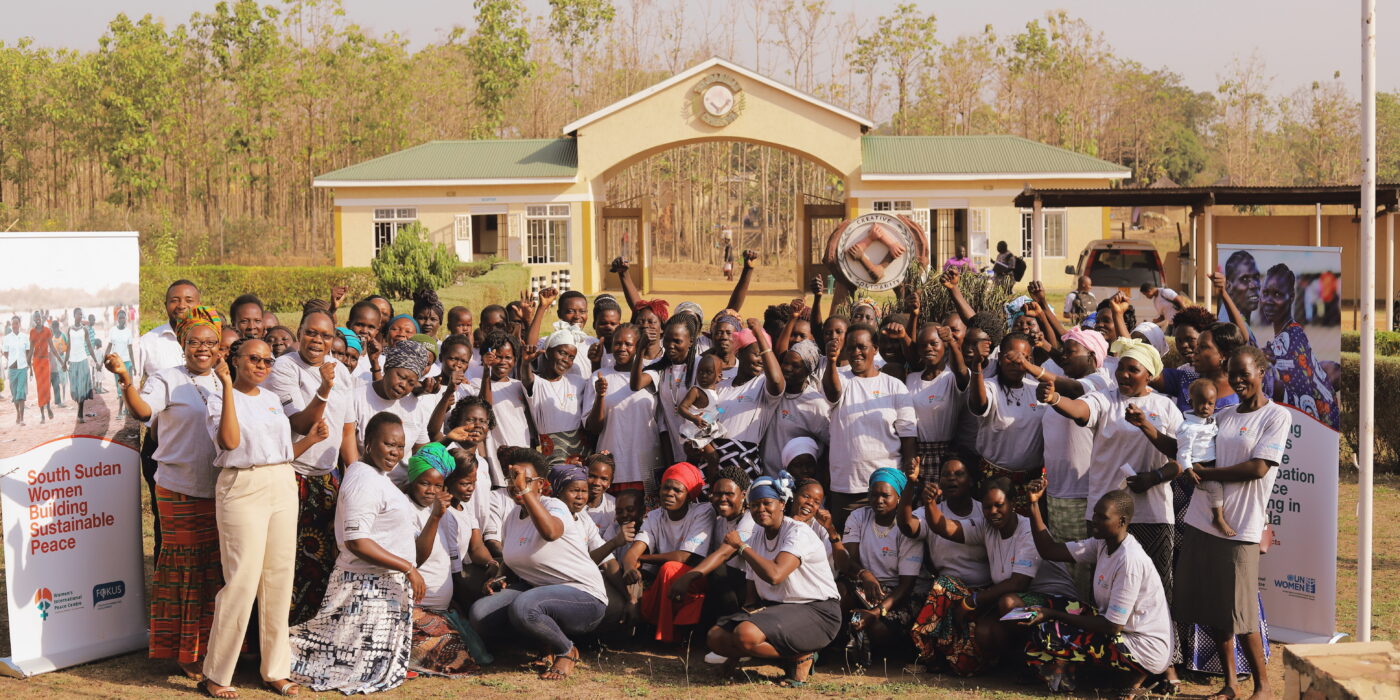25th to 26th FEBRUARY 2020; ADJUMANI – UGANDA
As part of its strategic goal to increase women’s participation in peacebuilding, the Peace Centre held a conference in form of an interdisciplinary dialogue that brought different actors together to engage with South Sudan women and girls refugees in Uganda.
The conference aimed to provide a platform for women refugees and other actors to access information on the progress of the peace processes in South Sudan and design strategies for continued incorporation of their voices and presence. It also provided an opportunity for women to share their experience in peacebuilding, learn from best practices, plan to address Women, Peace and Security concerns such as under-representation of women in defining and delivery of humanitarian-development services, shortage of specific measures and mechanisms to facilitate women’s sustained participation in the peace processes and accountability for gender-responsiveness.
This promoted women’s effective participation in decision making relating to the consolidation of peace and humanitarian assistance as well as contributed to closing real and perceived gaps between often-isolated local women (including refugee women) and larger national level women’s rights organizations engaged in advocacy on key peacebuilding processes hence facilitating connections between the refugee women and other counterparts supporting the engendering of the implementation of the peace agreement and related transitional processes in South Sudan.
The Conference convened 100 Participants including; Women Peace Mediators from Refugee Settlements in Yumbe, Adjumani and Kotido, Civil Society Leaders engaged in peace processes in South Sudan, The Peace Centre Staff, UN Women, Local Governments, Office of the Prime Minister, UNHCR, Implementing partners and aimed to achieve the following objectives:
• To provide a platform for refugee women to understand and receive updates on the peacebuilding processes in South Sudan
• To link the refugee women with other women involved in advocacy towards engendering the peace processes in South Sudan
• To ignite women’s ability to participate in the formal and informal peacebuilding processes right from the refugee settlement for sustainable peace in South Sudan.
The conference was a major success as it had the following outcomes:
- An outcome document that presents the recommendations of the refugee women to the Government of National Unity of South Sudan and the Government of Uganda was developed.
- During the conference, even though our focus was on informing the refugees of the ongoing peace process(es), there was a lot of conversation on their return back home, the conference received a report from the Office of the Prime Minister on the number of refugees arriving in Uganda currently, and this was explained as fear of the outcome of the recently sworn-in Transitional Government in South Sudan. Based on this the women demanded for specific actions relating to their return including a ceasefire and disarmament.
- Improved Relationship between refugees from Yumbe and Adjumani through networking. Most of the participants were joyful about the conference as they made new friends and were able to see the ones they hadn’t seen in a while
- Increased understanding on the peace building processes in South Sudan and the role of women in Peace building with Presentations from;
Betty Sunday from Community Empowerment for Progress Organization (CEPO South Sudan who opened up on the context of the South Sudan peace process.

This transitional period offers an excellent opportunity to put in place measures such as deliberately increasing the number of women in governance and political processes – Betty Sunday
- Jackline Nasiwa, Executive Director Centre for Inclusive Governance Peace and Justice (CIGPJ) gave a review of the transitions in South Sudan from 2013 to date, the role of women in peace processes and updates on the peace process; government being dissolved and appointment of 5 Vice Presidents, one being a woman. She also encouraged the women to organize themselves and be hopeful for peace in South Sudan

Dr Ronald Kalyango the lead researcher.
- Last but not least Dr Ronald Kalyango explained research findings on the implementing the revitalized Agreement on the Resolution of the Conflict in the Republic of South Sudan (R-ARCSS) from a gender perspective. From this, he was able to discuss the barriers to women’s participation in security sector reforms such as; resistance to women in military and societal borders by prescribing child care to women which holds them back.
- As a way forward, he listed recommendations like ensuring gender responsive budgeting, setting guidelines on how the government will encourage women participation in elections and supporting affirmative action for women participating in all institutions and processes. All this set the stage for a productive and involved discussion about the South Sudan peace process.






1 Comment